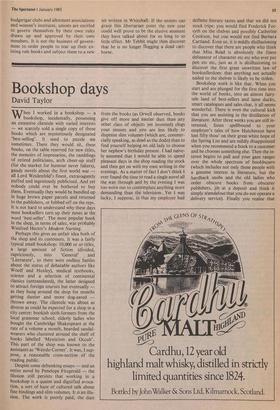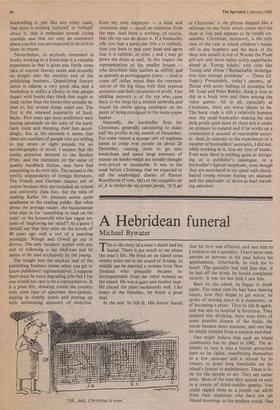Bookshop days
David Taylor
When I worked in a bookshop — a bookshop, incidentally, possessing an extensive clientele with varied interests — we scarcely sold a single copy of those books which are mysteriously designated 'best-selling'. It used to puzzle me sometimes. There they would sit, these books, on the table reserved for new titles, the memoirs of impresarios, the ramblings of retired politicians, arch cheer-up stuff (for the market for humour never falters), gaudy novels about the first world war all Lord Weidenfeld's finest, extravagantly Puffed and ingeniously publicised. And yet nobody could ever be bothered to buy them. Eventually they would be bundled up in huge brown paper parcels and returned to the publishers, or fobbed off on the reps. It is not hard to understand why these days most booksellers turn up their noses at the word 'best-seller'. The most popular book in the shop, in terms of sales, was probably Winifred Hector's Modern Nursing.
Perhaps this gives an unfair idea both of the shop and its customers. It was a fairly typical small bookshop: 10,000 or so titles, a large amount of fiction (divided, capriciously, into 'General' and 'Literature', so there were endless battles about the status of debatable authors like Woolf and Huxley), medical textbooks, science and a selection of continental classics (untranslated), the latter designed to attract foreign tourists but eventually as they hung around the shop for months getting dustier and more dog-eared thrown away. The clientele was about as diverse as could be expected for a shop in a city centre: bookish sixth-formers from the local grammar school, elderly ladies who bought the Cambridge Shakespeare at the rate of a volume a month, bearded sandal- wearers who clustered around the shelf of books labelled 'Mysticism and Occult'. This part of the shop was known to the assistants as 'Weirdo Corner'. It was, I sup- pose, a reasonable cross-section of the reading public.
Despite some debunking essays — and an entire novel by Penelope Fitzgerald — the illusion still persists that working in a bookshop is a quaint and dignified avoca- tion, a sort of haze of cultured talk about fine bindings and slim volumes. It is an illu- sion. The work is poorly paid, the dust from the books (as Orwell observed, books give off more and nastier dust than any other class of objects yet invented) clogs your sinuses and you are less likely to dispense slim volumes (which are, commer- cially speaking, as dead as the dodo) than to find yourself helping an old lady to choose her nephew's birthday present. I had naive- ly assumed that I would be able to spend pleasant days in the shop reading the stock and then get on with my own writing in the evenings. As a matter of fact I don't think I ever found the time to read a single novel all the way through and by the evening I was too worn out to contemplate anything more demanding than the television. Yet I was lucky, I suppose, in that my employer had definite literary tastes and that we did not stock tripe: you would find Frederick For- syth on the shelves and possibly Catherine Cookson, but you would not find Barbara Cartland. Even so, it is mildly disillusioning to discover that there are people who think that Miss Read is absolutely the finest delineator of character etc etc who ever put pen etc etc, just as it is disillusioning to discover the first great unwritten law of booksellerdom: that anything not actually nailed to the shelves is likely to be stolen.
Bookshop work is like that. When you start and are plunged for the first time into the world of books, into an almost fairy- tale land of best-sellers and lame ducks, smart catalogues and sales chat, it all seems wonderful. There is even the cultural kick that you are assisting in the distillation of literature. After three weeks you are still in- terested, listen spellbound to your employer's tales of how Hutchinson have lost fifty thou' on their great white hope of the Spring List and are mildly disappointed when you recommend a book to a customer and he chooses something else. Then the in- terest begins to pall and your gaze ranges over the whole spectrum of bookbuyers (which includes not only those people with a genuine interest in literature, but the hardback snobs and the old ladies who order obscure books from obscurer publishers, jib at a deposit and think it simply scandalous that you do not operate a delivery service). Finally you realise that
bookselling is just like any other trade, that there is nothing 'cultured' or 'refined' about it, that it embodies several crying scandals and that not only do customers abuse you but you are expected to be civil to them in return.
Nevertheless, to anybody interested in books working in a bookshop is a valuable experience in that it gives you firstly some idea of current literary tastes and secondly an insight into the murkier end of the publishing business. Quantifying literary tastes is seldom a very good idea and a bookshop is unlike a library in that people depart with books they think they ought to read, rather than the books they actually in- tend to, but several things stand out. The first is the renewed popularity of hard- backs. Five years ago most publishers were issuing jeremiads on the state of the hard- back trade and thinning their lists accor- dingly, but at the moment it seems that there are numbers of people who are willing to pay seven or eight pounds for an autobiography or novel. I suspect that the media attention devoted to the Booker Prize, and the insistence on the value of quality hardback fiction, may have had something to do with this. The second is the terrific unpopularity of foreign literature. The French and German classics sell of course because they are included on school and university class lists, but the idea of reading Kafka for pleasure seems quite anathema to the reading public. But what about the average reader, the businessman who slips in for 'something to read on the train' or the housewife who has vague no- tions of 'improving her mind'? At a guess I should say that they seize on the novels of 40 years ago with a sort of a yearning nostalgia. Waugh and Orwell go out in droves. The only 'modern' author with any sort of following is Ian McEwan and he seems to be read exclusively by the young.
The insight into the murkier end of the publishing business comes when you get to know publishers' representatives. I suppose there must be more degrading jobs but I for one would not care to be a representative. It is a poor life, shooting round the country with your case of specimen dust-jackets, staying in shabby hotels and putting up with astonishing amounts of invective.
Even my own employer — a kind and courteous man — stood no nonsense from the reps. And there is nothing, of course, that the rep can do about it. If a bookseller. tells you that a particular title x is rubbish, then you have to nod your head and agree that it is rubbish, or titles y and z may go down the drain as well. In this respect the representatives of the smaller houses who distribute their leaflets as shiftily and as sparsely as pornographic tracts — tend to come off rather worse than the represen- tatives of the big firms with their expense accounts and their certainties of profit. One abiding memory is of the rep who came back to the shop for a mislaid umbrella and found his entire spring catalogue on the point of being consigned to the waste-paper basket.
Naturally, the bookseller lives for Christmas; generally calculating to make half his profits in the month of December. For some reason a strange sort of madness seems to creep over people on about 20 December, causing them to go into bookshops and spend large amounts of money on books which are usually thought over-priced or unsuitable. It was in the week before Christmas that we expected to sell the unabridged diaries of Parson Woodforde (5 vols, £65) or the complete set of A la recherche du temps perdu. 'It'll go at Christmas' is the phrase slapped like a talisman on any book which comes into the shop in July and appears to be totally un- saleable. Christmas, moreover, is the only time of the year in which children's books sell in any numbers and the back of the shop was usually a riot of Winnie the Pooh gift-sets and those rather sickly paperbacks aimed at 'Young Adults' with titles like Young and Alone (`Remarkable investiga- tion into teenage problems' — Times Ed. Supp.) Presumably, today's parents, af- flicted with acute feelings of nostalgia for Mr Toad and Peter Rabbit, think it wise to slip in a book here and there among the video games. All in all, especially at Christmas, there are worse places to be. The book trade is still a relatively humane one: the small bookseller making his nice Mule profit (and most of them do) is under no pressure to expand and if he works up a connection is assured of reasonable securi- ty. And, in contrast to the experiences of a number of booksellers' assistants, I did not, while working in it, lose my love of books. Even now there is nothing quite so intrigu- ing as a publisher's catalogue, or a bookseller's lighted shopfront, even though they are associated in my mind with shock- haired young women buying sex manuals and the platitudes of down-at-heel travell- ing salesmen.



































 Previous page
Previous page